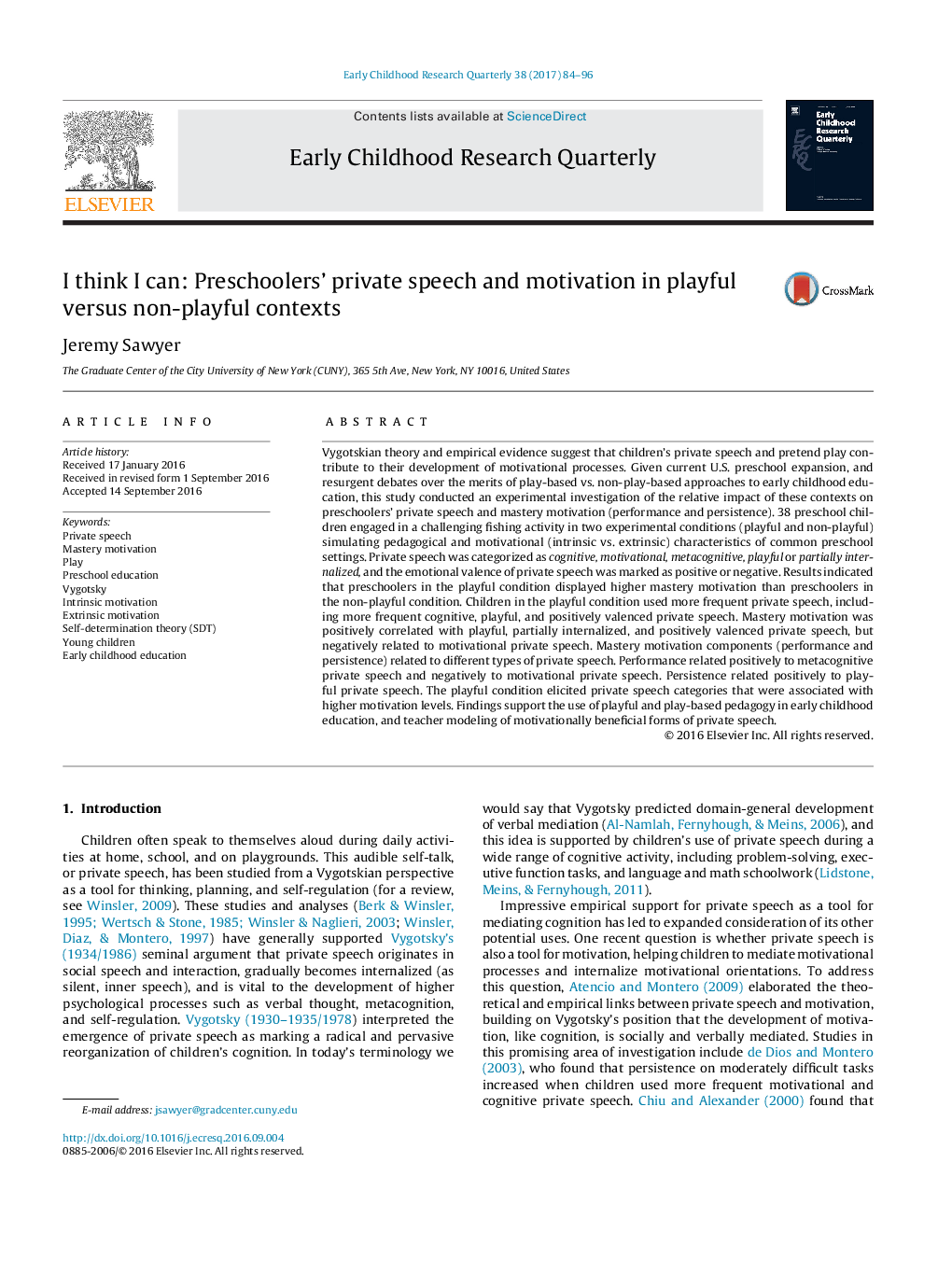| کد مقاله | کد نشریه | سال انتشار | مقاله انگلیسی | نسخه تمام متن |
|---|---|---|---|---|
| 4938244 | 1434717 | 2017 | 13 صفحه PDF | دانلود رایگان |
عنوان انگلیسی مقاله ISI
I think I can: Preschoolers' private speech and motivation in playful versus non-playful contexts
ترجمه فارسی عنوان
من فکر می کنم می توانم: سخنرانی و انگیزه خصوصی کودکان پیش دبستانی در زمینه های بازیگوش و غیرشخصی
دانلود مقاله + سفارش ترجمه
دانلود مقاله ISI انگلیسی
رایگان برای ایرانیان
کلمات کلیدی
ترجمه چکیده
تئوری ویگوتسکی و شواهد تجربی نشان می دهد که سخنرانی خصوصی کودکان و تظاهر به نقش خود در توسعه فرایندهای انگیزشی کمک می کند. با توجه به گسترش روزافزون پیش دبستانی در ایالات متحده و بحث های تازه در مورد شایستگی های مبتنی بر بازی های مبتنی بر بازی و غیر مبتنی بر آموزش به دوران کودکی، این مطالعه یک بررسی تجربی از تاثیر نسبی این زمینه ها بر روی گفتار خصوصی و انگیزه تسلط کودکان پیش دبستانی (عملکرد و پایداری). 38 کودک پیش دبستانی که در دو شرایط آزمایشی مشغول فعالیت ماهیانه و چالش برانگیز هستند (شبیه سازی و بازی نکردن)، شبیه سازی ویژگی های آموزشی و انگیزشی (درونی و بیرونی) تنظیمات پیش دبستانی مشترک. سخنرانی خصوصی به عنوان شناختی، انگیزشی، فراشناختی، بازیگری و یا جزئی درونی شناخته شده بود و ارزش های احساسی گفتار خصوصی مثبت یا منفی بود. نتایج نشان داد که کودکان پیش دبستانی در شرایط جالبی انگیزه تسلط بیشتری را نسبت به کودکان پیش دبستانی در شرایط غیرشخصی نشان دادند. کودکانی که در حالت عادت ماهانه سخنرانی خصوصی خود را از جمله مکرر سخنرانی خصوصی، شناختی، بازیگری و مثبت و منصفانه استفاده می کنند. انگیزه تسلط به طور مثبتی با سخنرانی خصوصی بازیگوش، تقریبا درونی شده و مثبت و منفی مرتبط با گفتار خصوصی انگیزشی ارتباط دارد. اجزای انگیزه تسلط (عملکرد و پایداری) مربوط به انواع مختلف سخنرانی خصوصی است. عملکرد به طور مثبت به گفتار خصوصی فراشناختی منفی و منفی به سخنرانی خصوصی انگیزشی. پایداری مثبت به سخنرانی خصوصی بازی می کند. شرایط بازیگری، مقولههای گفتاری خصوصی را که با سطوح انگیزه بالاتر مرتبط بودند، مطرح میکرد. یافته ها پشتیبانی از استفاده از آموزشکده های بازیگوشانه و بازی در آموزش ابتدایی کودکان و مدل سازی معلمان از اشکال انگیزشی سودمند از گفتار خصوصی.
موضوعات مرتبط
علوم انسانی و اجتماعی
روانشناسی
روان شناسی کاربردی
چکیده انگلیسی
Vygotskian theory and empirical evidence suggest that children's private speech and pretend play contribute to their development of motivational processes. Given current U.S. preschool expansion, and resurgent debates over the merits of play-based vs. non-play-based approaches to early childhood education, this study conducted an experimental investigation of the relative impact of these contexts on preschoolers' private speech and mastery motivation (performance and persistence). 38 preschool children engaged in a challenging fishing activity in two experimental conditions (playful and non-playful) simulating pedagogical and motivational (intrinsic vs. extrinsic) characteristics of common preschool settings. Private speech was categorized as cognitive, motivational, metacognitive, playful or partially internalized, and the emotional valence of private speech was marked as positive or negative. Results indicated that preschoolers in the playful condition displayed higher mastery motivation than preschoolers in the non-playful condition. Children in the playful condition used more frequent private speech, including more frequent cognitive, playful, and positively valenced private speech. Mastery motivation was positively correlated with playful, partially internalized, and positively valenced private speech, but negatively related to motivational private speech. Mastery motivation components (performance and persistence) related to different types of private speech. Performance related positively to metacognitive private speech and negatively to motivational private speech. Persistence related positively to playful private speech. The playful condition elicited private speech categories that were associated with higher motivation levels. Findings support the use of playful and play-based pedagogy in early childhood education, and teacher modeling of motivationally beneficial forms of private speech.
ناشر
Database: Elsevier - ScienceDirect (ساینس دایرکت)
Journal: Early Childhood Research Quarterly - Volume 38, 1st Quarter 2017, Pages 84-96
Journal: Early Childhood Research Quarterly - Volume 38, 1st Quarter 2017, Pages 84-96
نویسندگان
Jeremy Sawyer,
